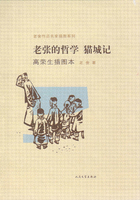In May 1850 a few, copies of In Memoriam were printed for friends, and presently the poem was published without author's name. The pieces had been composed at intervals, from 1833 onwards. It is to be observed that the "section about evolution" was written some years before 1844, when the ingenious hypotheses of Robert Chambers, in Vestiges of Creation, were given to the world, and caused a good deal of talk. Ten years, again, after In Memoriam, came Darwin's Origin of Species. These dates are worth observing. The theory of evolution, of course in a rude mythical shape, is at least as old as the theory of creation, and is found among the speculations of the most backward savages. The Arunta of Central Australia, a race remote from the polite, have a hypothesis of evolution which postulates only a few rudimentary forms of life, a marine environment, and the minimum of supernormal assistance in the way of stimulating the primal forms in the direction of more highly differentiated developments. "The rudimentary forms, Inapertwa, were in reality stages in the transformation of various plants and animals into human beings. . . . They had no distinct limbs or organs of sight, hearing, or smell." They existed in a kind of lumps, and were set free from the cauls which enveloped them by two beings called Ungambikula, "a word which means 'out of nothing,' or 'self-existing.' Men descend from lower animals thus evolved."
This example of the doctrine of evolution in an early shape is only mentioned to prove that the idea has been familiar to the human mind from the lowest known stage of culture. Not less familiar has been the theory of creation by a kind of supreme being. The notion of creation, however, up to 1860, held the foremost place in modern European belief. But Lamarck, the elder Darwin, Monboddo, and others had submitted hypotheses of evolution. Now it was part of the originality of Tennyson, as a philosophic poet, that he had brooded from boyhood on these early theories of evolution, in an age when they were practically unknown to the literary, and were not patronised by the scientific, world. In November 1844 he wrote to Mr Moxon, "I want you to get me a book which I see advertised in the Examiner: it seems to contain many speculations with which I have been familiar for years, and on which I have written more than one poem." This book was Vestiges of Creation. These poems are the stanzas in In Memoriam about "the greater ape," and about Nature as careless of the type: "all shall go." The poetic and philosophic originality of Tennyson thus faced the popular inferences as to the effect of the doctrine of evolution upon religious beliefs long before the world was moved in all its deeps by Darwin's Origin of Species. Thus the geological record is inconsistent, we learned, with the record of the first chapters of Genesis. If man is a differentiated monkey, and if a monkey has no soul, or future life (which is taken for granted), where are man's title-deeds to these possessions? With other difficulties of an obvious kind, these presented themselves to the poet with renewed force when his only chance of happiness depended on being able to believe in a future life, and reunion with the beloved dead. Unbelief had always existed. We hear of atheists in the Rig Veda. In the early eighteenth century, in the age of Swift -"Men proved, as sure as God's in Gloucester, That Moses was a great impostor."distrust of Moses increased with the increase of hypotheses of evolution. But what English poet, before Tennyson, ever attempted "to lay the spectres of the mind"; ever faced world-old problems in their most recent aspects? I am not acquainted with any poet who attempted this task, and, whatever we may think of Tennyson's success, I do not see how we can deny his originality.
Mr Frederic Harrison, however, thinks that neither "the theology nor the philosophy of In Memoriam are new, original, with an independent force and depth of their own." "They are exquisitely graceful re-statements of the theology of the Broad Churchman of the school of F.
D. Maurice and Jowett--a combination of Maurice's somewhat illogical piety with Jowett's philosophy of mystification." The piety of Maurice may be as illogical as that of Positivism is logical, and the philosophy of the Master of Balliol may be whatever Mr Harrison pleases to call it. But as Jowett's earliest work (except an essay on Etruscan religion) is of 1855, one does not see how it could influence Tennyson before 1844. And what had the Duke of Argyll written on these themes some years before 1844? The late Duke, to whom Mr Harrison refers in this connection, was born in 1823. His philosophic ideas, if they were to influence Tennyson's In Memoriam, must have been set forth by him at the tender age of seventeen, or thereabouts. Mr Harrison's sentence is, "But does In Memoriam teach anything, or transfigure any idea which was not about that time" (the time of writing was mainly 1833-1840) "common form with F. D.
Maurice, with Jowett, C. Kingsley, F. Robertson, Stopford Brooke, Mr Ruskin, and the Duke of Argyll, Bishops Westcott and Boyd Carpenter?"The dates answer Mr Harrison. Jowett did not publish anything till at least fifteen years after Tennyson wrote his poems on evolution and belief. Dr Boyd Carpenter's works previous to 1840 are unknown to bibliography. F. W. Robertson was a young parson at Cheltenham.
Ruskin had not published the first volume of Modern Painters. His Oxford prize poem is of 1839. Mr Stopford Brooke was at school. The Duke of Argyll was being privately educated: and so with the rest, except the contemporary Maurice. How can Mr Harrison say that, in the time of In Memoriam, Tennyson was "in touch with the ideas of Herschel, Owen, Huxley, Darwin, and Tyndall"? When Tennyson wrote the parts of In Memoriam which deal with science, nobody beyond their families and friends had heard of Huxley, Darwin, and Tyndall.















